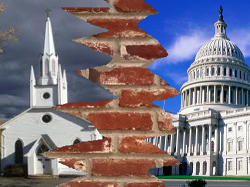
Some churches and religious groups complain about separation of church and state when they want to force their views into the public sphere like schools and government. However when these groups want to discriminate they become the biggest fans of the wall between church and state. They shouldn’t have it both ways.
A teacher at a church school in Redford Township, Michigan was fired when the school board wouldn’t allow her to return to work after a long medical leave.
In 2005, [Cheryl] Perich, who taught mostly secular subjects as well as some religious studies, simply wanted to return to the classroom after her neurologist determined her narcolepsy was under control with medication. She’d been on disability leave for what was first suspected as a heart problem, and after about six months, Perich’s doctor cleared her to return to work.
But the principal and the board at Hosanna-Tabor Evangelical Lutheran Church and School in Redford didn’t believe she was ready, so they refused to reinstate her. Perich, a teacher there for five years without incident, threatened “legal action” to get her job back. She was fired.
School officials say she had violated a tenet of the Lutheran faith enacted in school policy — that school employees could only resolve disputes through internal church procedures and hearings.
So Perich was fired for threatening to assert her rights under the Americans with Disabilities Act. The church school board also refused to accept the view of her Doctor that she was ready to return to work.
The school is wanting to use the ‘Ministerial exception’ to the Civil Rights Act of 1964 to win the case. The exception had been put in to allow religious employers to discriminate:
Legal challenges since then have upheld that provision and allowed courts to create what’s called the “ministerial exception.” The legal doctrine, largely crafted in appellate court rulings, has held that ministers and others with significant religious duties can’t bring discrimination claims against the churches, temples or mosques that employ them.
So the question the US Supreme Court needs to resolve is if the exception applies to anyone employed by a church or religious group no matter what their specific duties are.
The danger of letting the church school prevail is that an exception could apply to all religiously run organizations and businesses:
The church has filed its briefs in the case and has supportive filings from nearly two dozen religious groups and associations, including the Muslim-American Public Affairs Council, the American Jewish Committee, the American Association of Christian Schools and the American Bible Society. Largely, they are arguing for affirmation of the ministerial exception for parochial school teachers and also its expansion to apply to other employees with responsibilities for religious instruction or who perform what are considered to be religious functions. That could include nurses in Catholic hospitals, for example, drug counselors at treatment facilities operated by religious groups, and anyone else the religious institution determines has job duties related to religious tenets.
Michigan’s Attorney General Bill Schuette also authored an amicus brief, supported by seven other state Republican attorneys general, arguing for the expansion of the ministerial exception to employees beyond religious leaders and to other employees.
“Such a standard will avoid unnecessary state entanglements in religious affairs,” Schuette wrote, “including potential entanglement in determining whether a religious employee is subject to state investigation or judicial review.” That would protect religious institutions from investigations of employment-discrimination complaints with state civil rights departments, for instance, and would prevent such employment-discrimination lawsuits from being adjudicated in state courts.
I agree that if the issue is specific to religious leadership then it should be resolved internally BUT allowing the exception for any employee no matter what their job duties are would give special treatment to religion and would be contrary to the 1st Amendment.
With the current make up of the Supreme Court I am not optimistic that the church will lose the case.